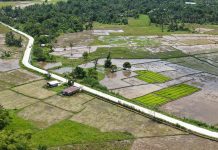TACLOBAN CITY – The United Nation’s Children Fund (Unicef) and the World Health Organization vowed to help the Philippine government to re-establish the national immunization program by rebuilding the cold chain infrastructure which was severely damaged by Supertyphoon Yolanda in November last year.
Unicef and WHO’s commitment is to make the cold chain infrastructure resilient by providing equipment that will be able to withstand future calamities.
As reported by the Department of Health, when Typhoon Yolanda hit, Leyte and Eastern Samar provinces were among the hardest hit areas, with Tacloban City bearing the brunt. Health care infrastructure was severely damaged; and cold chain equipment and vaccines were destroyed.
Cold chain is a system used for keeping and distributing vaccines in a condition that retains its ability to give protection against disease. The cold chain consists of a series of storage and transport links, which are all designed to keep the vaccine at the correct temperature until it reaches the user, namely children and mothers in need of immunization. With most of the cold chain in the typhoon-affected areas being destroyed, more than 1.8 million affected children are at risk of disease and death.
WHO already delivered 16 solar powered vaccine refrigerators to key points in Leyte to enable autonomous storage of vaccine stock replenishment from the Department of Health’s warehouses. WHO together with Unicef has also trained health workers to improve vaccine and cold chain management.
Unicef will assist 450 DOH health care facilities at different levels by providing them with earthquake and typhoon resistant cold chain equipment; including 5,000 temperature monitoring devices, 4,000 vaccine carriers, 800 cold boxes, 400 back-up generator systems, 150 ice-lined refrigerators, 50 solar-powered refrigerators and 200 Sure Chill freezers running on an innovative cooling technology, allowing them to operate for more than ten days without electricity.
Additionally, 16 walk-in cold rooms for vaccine storage will be constructed at the regional and provincial levels, supported by three million doses of measles-rubella and oral polio vaccines. Based on in-depth assessment of short term requirements for routine immunization in affected regions, the equipment donation is budgeted at US$8 million.
WHO Representative in the Philippines Julie Hall said the importance of building back better when ensuring that health infrastructure, which includes services, facilities, and equipment for the most vulnerable populations is present, as this is an essential step in guaranteeing healthy and capable communities.
In this regard, WHO, together with the Unicef and other partners recently turned over to the Tacloban City Health Office an immunization equipment. These agencies plan to establish the cold chain first in Tacloban; and then expand the program across the typhoon-affected area. (AHLETTE C. REYES)



